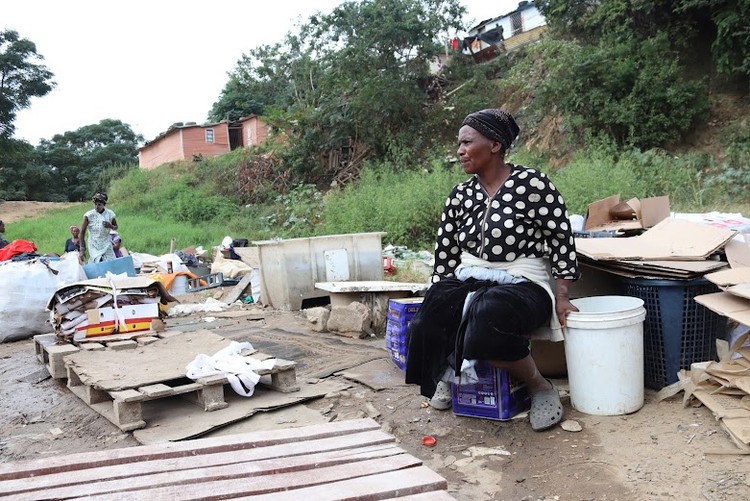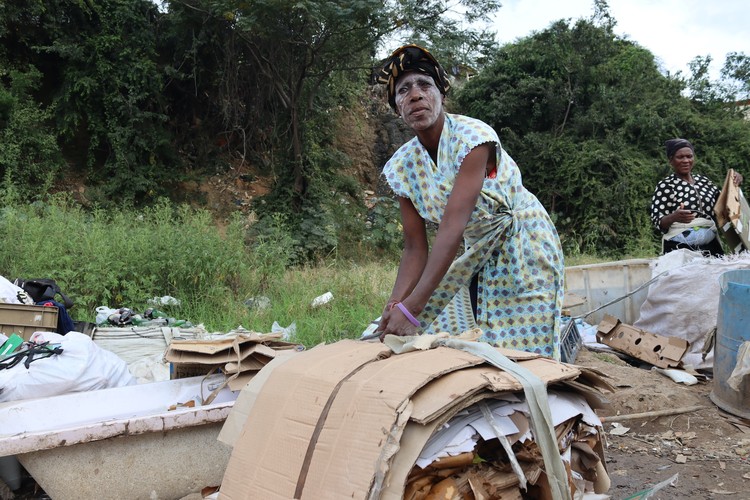Determined Durban moms recycle cardboard
“This is a ticket to send our children to university”
“I’m collecting this dirty cardboard for my children to have a brighter future,” says Nontlantla Chitha. Photo: Manqulo Nyakombi
At the corner of Jan Smuts Avenue and Mayville Main Road in Durban, six women gather every day waiting for a truck to come and fetch the cardboard they have collected.
From 1pm to 6pm they gather here, just a few metres from the Marikana informal settlement in Meyville.
There’s laughing and singing as the women pack the cardboard. Each woman has her own spot.
They have a common goal: to make money to send their children to school.
Nontlantla Chitha has three children, one at a college in Pietermaritzburg, one just out of school, and one still in high school.
Every morning she leaves her house at 5am to collect cardboard. She has been doing this for the past 12 years.
“I was married to a very stingy man. At the time I was not working. We were living in Pietermaritzburg. I was not happy and my children were not getting what they wanted,” said Chitha. She said her dream was to see at least one of her children go to college or university. She left her marriage to look for a job, but could not find work.
Then she saw an opportunity in recycling.
“At first I didn’t know what to recycle. Most people were collecting tins and metal. I went to ask a factory not far from where I stayed about recycling cardboard. The woman I spoke to said they can assist me but the money is very little,” she said.
“To me it was better than sitting at home waiting for my husband to give me money only when he wants to. I started collecting cardboard and selling it. I started by making R150 a week, the following week I got better and in no time I was making a lot of money,” she said.
When the company she sold to closed in 2021, during the riots, Chitha moved to Durban to live with her brother, leaving her children at home in Pietermaritzburg.
“When I arrived here I saw this spot. There were women recycling tins but not cardboard. I told them about recycling cardboard. We did our research on how to find a buyer and luckily we got one. Since 2021, we have been using this spot.”
“The job has its challenges, it’s dirty and people look down on us, but to us, this is a ticket to send our children to university,” she said with a big smile. She makes about R3,400 a month.
“We have a slogan here that says giving up is not an option,” she said.
When GroundUp visited the spot we found the women singing. All are single mothers who are striving for their children.
“I always tell them not to depend on a man,” said Chitha, laughing.
“We don’t just sit here waiting for the truck to come to collect the cardboard. We also talk about life. We give each other advice about domestic violence. We help each other. When one of us has a challenge and does not have enough cardboard, we collect some money among ourselves to help. We are a family here,” she said.
“In this life you can’t survive alone.”
Chitha said she found great joy knowing her daughter is in college.
“I’m collecting this dirty cardboard for my children to have a brighter future, the one I didn’t get,” she said. “I will continue until the last one also goes to university.”
Nonyamezelo Maphela has been bringing cardboard to this pick up point for recycling since 2021. Photo: Manqulo Nyakombi
Nonyamezelo Maphela started working with Chitha in 2021. In a month she makes between R3,000 and R3,800, she says.
“Here we are all single mothers who are working very hard to see our children achieving what we have not achieved.”
“We are all from the Marikana informal settlement and living conditions there are very bad. I raised my children having to relieve themselves in bushes, I don’t want them to raise their children in such an environment.”
Her elder son has finished grade 12 and is working as a taxi driver while he applies to join the police. The second son, still in high school, hopes to study medicine.
Chitha’s daughter Naledi, who is in her second year of mechanical engineering at Umgungundlovu College, says she is proud of her mother.
“She is doing all she can to survive. I admire her for that,” said Naledi.
Support independent journalism
Donate using Payfast

Don't miss out on the latest news
We respect your privacy, and promise we won't spam you.
Next: Thabo Bester escape: state says prison CCTV technician was offered R2.5-million bribe
Previous: We have to buy water for R300 a month, say families in Mpumalanga villages
© 2023 GroundUp. This article is licensed under a Creative Commons Attribution-NoDerivatives 4.0 International License.
You may republish this article, so long as you credit the authors and GroundUp, and do not change the text. Please include a link back to the original article.
We put an invisible pixel in the article so that we can count traffic to republishers. All analytics tools are solely on our servers. We do not give our logs to any third party. Logs are deleted after two weeks. We do not use any IP address identifying information except to count regional traffic. We are solely interested in counting hits, not tracking users. If you republish, please do not delete the invisible pixel.


